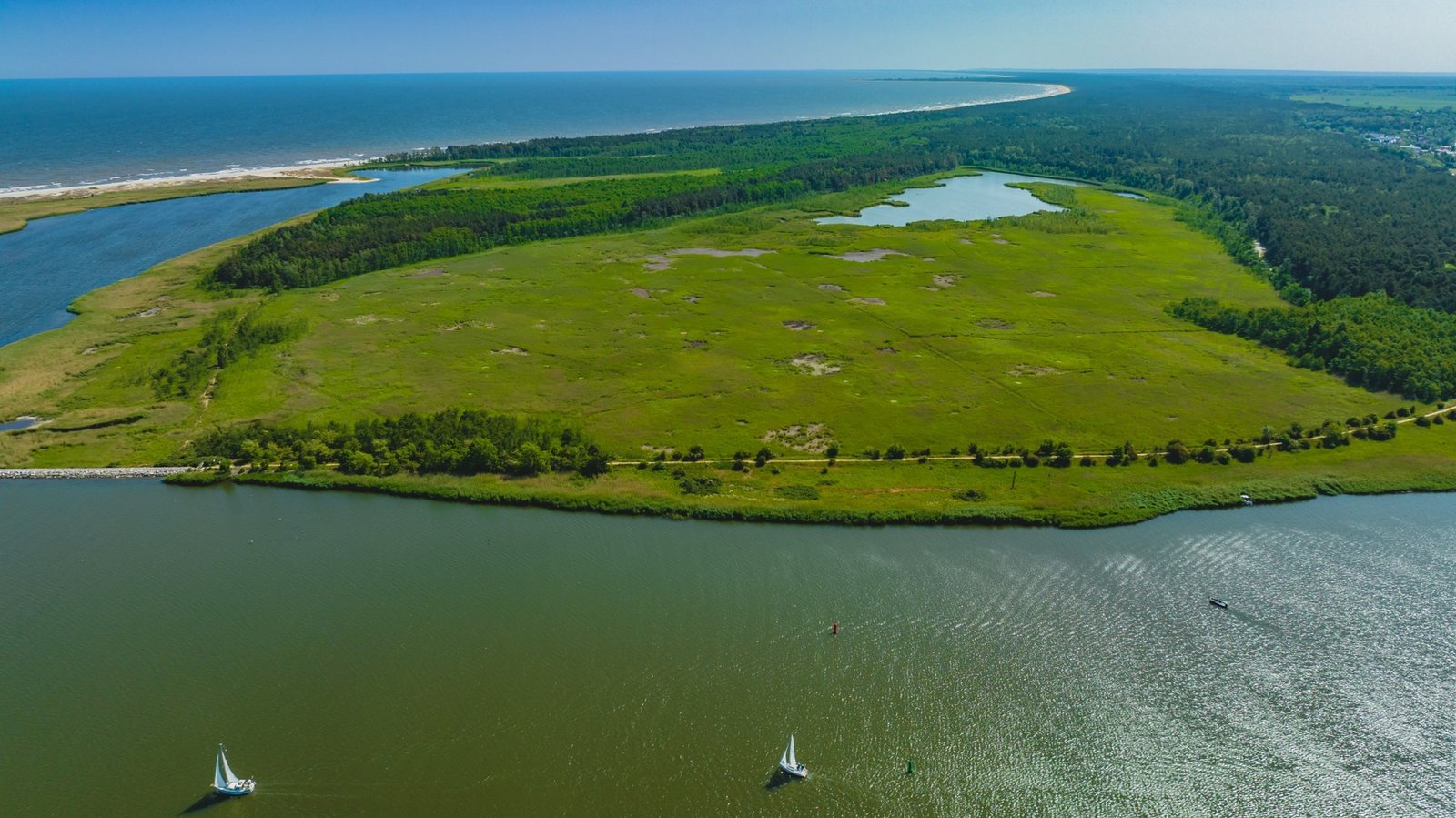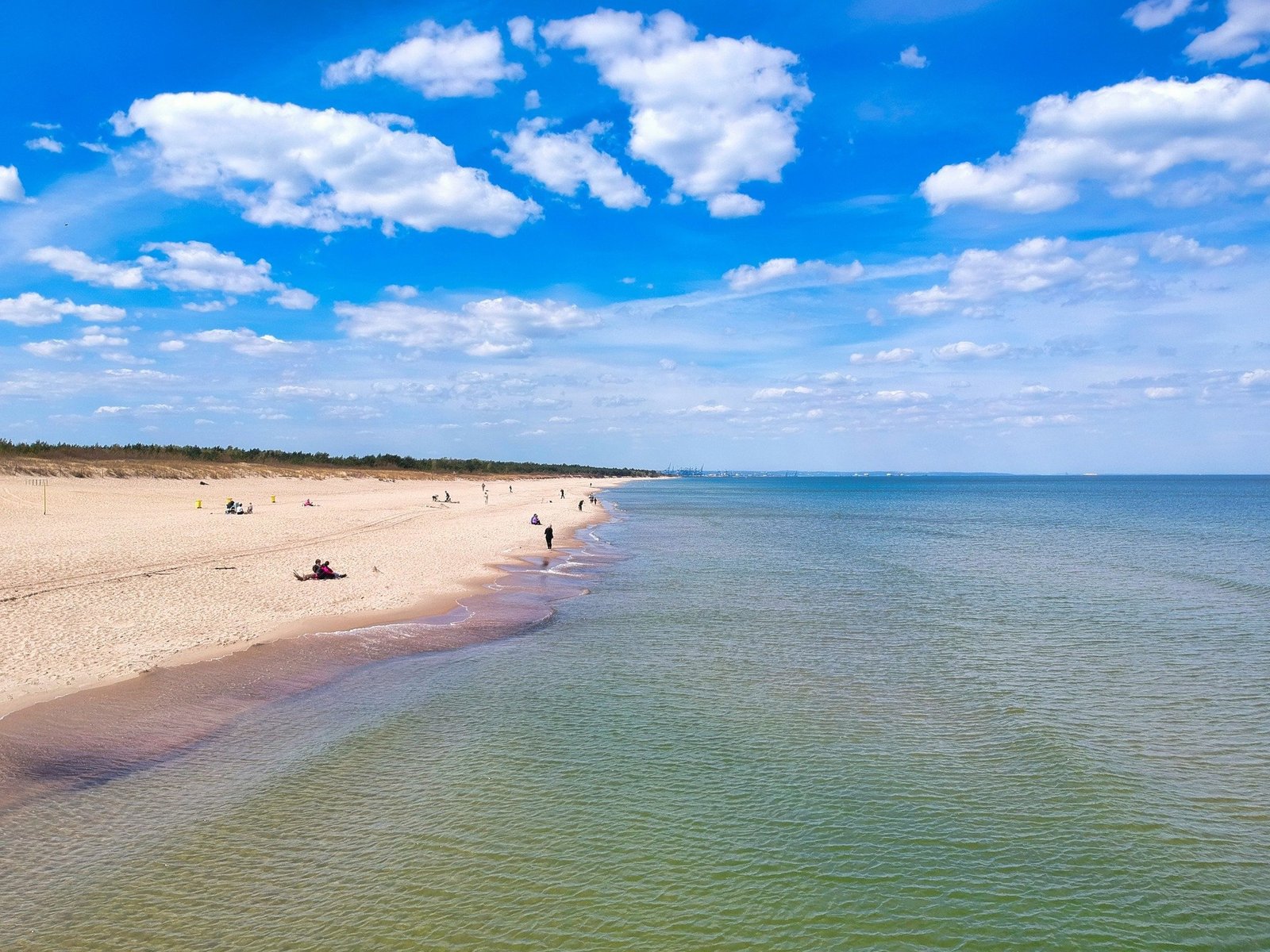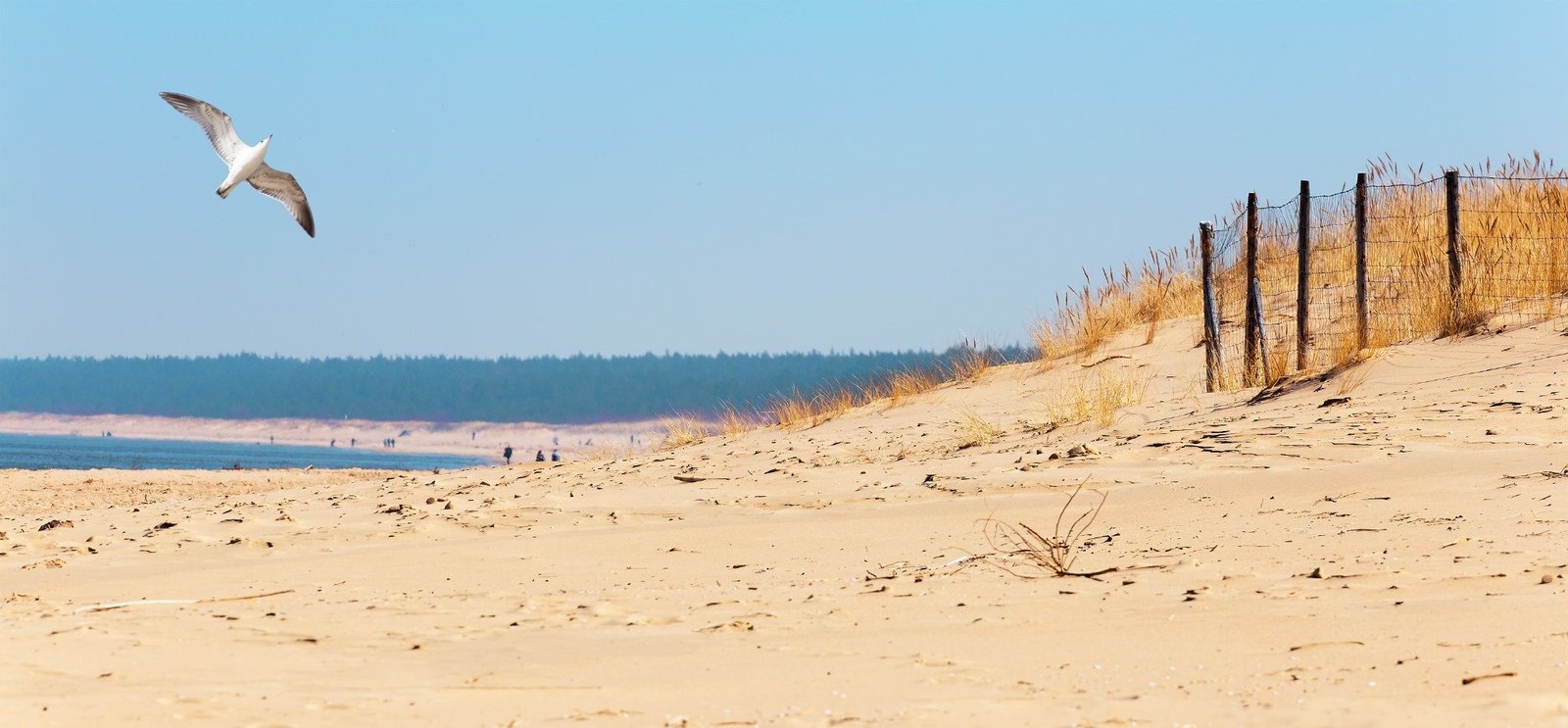Sobieszewo
A practical guide to what to do in Sobieszewo
Discover Sobieszewo: history, nature, and relaxation by the Baltic Sea
Nestled just 15 kilometers from Gdańsk, Sobieszewo is a charming coastal village known for its pristine beaches, rich wildlife, and peaceful atmosphere. With a history shaped by the Vistula River and Mennonite settlers, Sobieszewo offers a unique blend of natural beauty and cultural heritage. Whether you're looking for tranquil seaside relaxation, birdwatching in protected nature reserves, or scenic cycling routes, Sobieszewo is the perfect escape from the city.
A Brief History of Sobieszewo
Sobieszewo, a village located on Sobieszewo Island, has a rich history deeply intertwined with the development of the Vistula River Delta. The area’s geography was significantly shaped by natural and human interventions over the centuries.
In 1840, a powerful flood caused the Vistula River to carve a new estuary, known as the Śmiała Wisła (Bold Vistula), cutting through the sandy land that connected the area to the mainland. This natural event played a key role in forming the island as it is today. Later, in 1895, an artificial canal called Przekop Wisły (Vistula Dug-through) was constructed to better regulate the river’s flow, permanently defining Sobieszewo’s boundaries.
Throughout history, Sobieszewo has been a strategic location for trade, fishing, and navigation. The region was once inhabited by Mennonite settlers, who were known for their expertise in water management and land reclamation. Traces of their presence can still be seen in the form of historic Mennonite gravestones scattered across the area.
During World War II, Sobieszewo and its surroundings played a role in Germany’s military infrastructure. One of the remaining historical sites is Forsterówka, a villa that once served as a summer retreat for Nazi officials. Today, it stands as a silent reminder of the area’s complex past.
Following the war, Sobieszewo became a part of Poland and was gradually developed as a recreational and nature-focused destination. In 1994, due to its exceptional natural value, Sobieszewo Island was designated a Protected Landscape Area, ensuring the conservation of its forests, dunes, and wetlands.
Sobieszewo is a hidden gem that perfectly combines history, nature, and relaxation. Whether you’re a birdwatcher, history buff, beach lover, or outdoor enthusiast, Sobieszewo has something unique to offer. Its pristine beaches, rich wildlife, and peaceful atmosphere make it an ideal escape from the city, while its fascinating history and cultural heritage add depth to the experience.
Plan your visit to Sobieszewo and discover one of Poland’s most underrated coastal treasures!

Ptasi Raj (Birds' Paradise) Nature Reserve
One of Sobieszewo’s most famous attractions, this nature reserve is a must-visit for birdwatchers and wildlife enthusiasts. Located on the western side of the village, it is home to over 200 bird species, including swans, cormorants, and white-tailed eagles. Two scenic walking trails lead visitors through wetlands, coastal forests, and observation towers offering stunning views of the Baltic coastline.

Sobieszewo Beach
A Hidden gem by the Baltic Sea
Unlike the busy beaches of Sopot and Gdynia, Sobieszewo Beach is peaceful and less crowded, offering golden sand dunes and clean waters perfect for swimming, sunbathing, and long seaside walks. It’s an ideal place for visitors looking for a quiet retreat by the sea.
Mennonite Gravestones
A glimpse into the past
The area around Sobieszewo was once inhabited by Mennonites, a Protestant group known for their contributions to water management and farming in Poland. Several Mennonite gravestones, dating back to the 18th and 19th centuries, can still be found, serving as historical relics of the village’s diverse past.
Kazimierz Water Reservoir
A viewpoint over Sobieszewo
This modern water tower, located on a high dune, features an observation deck that offers a breathtaking panoramic view of the Baltic Sea, the Vistula Delta, and Sobieszewo’s surrounding forests. The site also features an interactive exhibition about water conservation and the local environment.


Amber hunting
A local tradition
Kazimierz, the historic Jewish quarter, is a vibrant area known for its unique blend of old-world charm and modern flair. This district, with its synagogues, cobblestone streets, and eclectic cafes, tells the story of Kraków’s diverse cultural heritage. It’s a lively spot for nightlife, with numerous bars and restaurants offering a taste of the local scene.
Top things to see and do in Sobieszewo
Check out our recommendation to top things not to miss when visiting Sobieszewo
Acommodation in Sobieszewo
Check out our recommendations below
Where to eat in Sobieszewo
Check out our recommendations
Practical information
Some practical information to Kraków
Bus Line 208 and 252:
- Schedule: Bus 208 runs every hour on weekdays, weekends, and public holidays. Bus 252 operates more frequently, every 30 minutes on weekdays and every hour on weekends and public holidays. Both buses operate from early morning until late evening.
- Duration: The journey to Kraków Główny (main railway station) takes around 40 minutes.
- Cost: Approximately 6 PLN (€1.30). Tickets can be purchased from vending machines at the bus stop, from the driver, or using mobile apps. Cash and card payments are accepted.
- Details: The bus stop is located near the terminal, within a short walking distance. There are ticket vending machines at the stop, and you can also buy tickets directly from the driver.
Night Bus 902:
- Schedule: The night bus operates hourly, connecting the airport with central Kraków. It runs from around 11:00 PM until 4:00 AM, ideal for late-night arrivals.
- Details: The night bus stops at Kraków Główny station and other central locations, catering to passengers arriving after regular bus hours.
Train Line: Kraków Airport – Kraków Główny
- Schedule: Trains run every 30 minutes from 5:17 AM to 12:15 AM daily, offering frequent and reliable service between the airport and the city center.
- Duration: The journey takes about 18 minutes, with no changes required.
- Cost: Approximately 17 PLN (€3.60). Tickets can be purchased from vending machines on the platform, from conductors on the train, or via mobile apps. Both cash and card payments are accepted.
- Details: The train departs from Kraków Lotnisko (Kraków Airport) station, located adjacent to the terminal. The final stop is Kraków Główny (main railway station), providing easy access to the city center.
- Duration: Approximately 20-30 minutes, depending on traffic.
- Cost: Around 90-110 PLN (€20-25). Prices may vary based on the time of day and traffic conditions. Taxis are readily available outside the terminal.
- Details: Taxi stands are located just outside the arrivals terminal. For reliable service, you can use reputable companies such as iCar, Kraków Airport Taxi.
- Comfort: Private transfers offer direct transportation to your accommodation or any location of your choice. While more expensive than taxis, they provide extra comfort, privacy, and convenience, especially for groups or those with more luggage.
- Booking: Private transfers can be booked in advance through several companies, including Kraków Airport Transfers, Krakow Direct, and Welcome Pickups.
- Details: Drivers will wait for you in the arrivals hall holding a sign with your name. This service ensures a comfortable, hassle-free experience from the moment you arrive. Private transfers often include amenities such as bottled water and Wi-Fi in the vehicle.
- Route: Kraków Airport (John Paul II International Airport) is located about 11 km (7 miles) from the city center. The most common route is via A4 motorway or DW774 road. From the city, follow signs for the A4 motorway toward the airport. Exit at Balice (Airport) and follow the signs to the terminal.
- Duration: The drive typically takes about 20-30 minutes, depending on traffic.
- Parking: The airport offers several parking options:
- P1 (Premium): Located directly in front of the terminal for short-term parking.
- P2 and P3: Mid-term and long-term parking options, a short walk from the terminal.
- Kiss & Fly: Provides 10 minutes of free parking for quick drop-offs or pick-ups.
- P1 (Premium): Located directly in front of the terminal for short-term parking.
- Car Rentals: Several car rental companies operate at Kraków Airport, including Avis, Budget, Hertz, Sixt, and Europcar. The rental car area is located within walking distance of the terminal.
- Cost: If parking at the airport, prices vary depending on the duration and parking zone. Parking fees start around 10 PLN (€2.20) per hour.
Driving to the airport offers flexibility and convenience, especially for travelers with luggage or those who prefer direct transportation to/from the terminal.
Uber
- Availability: Uber operates in Kraków, providing convenient and cashless rides.
- Cost: Fares vary based on traffic, time of day, and demand. The app provides an estimate before you confirm the ride.
- Pickup Location: The app will guide you to the pickup location at the airport. Follow the instructions and look for ride-hailing pickup signs.
- Details: Ensure the car color, make, and driver details match those in the app before getting into the vehicle. Contact the driver through the app if needed (Uber).
Bolt
- Availability: Bolt is another popular ride-sharing option, often cheaper than other services.
- Cost: Competitive pricing, with cost details shown in the app before confirming the ride.
- Pickup Location: Open the Bolt app to request a ride. The app will show you the pickup points at the airport.
- Details: Bolt rides are known for being quick and affordable. Ensure that the vehicle details match those in the app before boarding (Bolt)
Kraków offers an extensive and efficient public transportation system, operated by MPK Kraków (Miejskie Przedsiębiorstwo Komunikacyjne), which includes buses and trams. This system covers both the city center and surrounding areas, providing reliable transportation for residents and visitors.
Bus Services:
- Coverage: The bus network in Kraków spans a wide area, connecting the city center with the suburbs and neighboring regions.
- Frequency: Buses run frequently throughout the day, with increased services during peak hours. Night buses are available for late-night travel.
- Night Services: Night buses operate between 11:00 PM and 5:00 AM, providing connections throughout the city when regular buses and trams do not run.
Tram Services:
- Coverage: The tram network is extensive and serves key areas, including the city center, main tourist attractions, and residential neighborhoods. Trams are a preferred option for tourists visiting major sites such as the Old Town, Kazimierz, and Wawel Castle.
- Frequency: Trams run frequently, particularly during peak times, offering a fast and reliable way to get around the city.
- Night Services: Some tram lines operate overnight, catering to late-night travelers.
Ticketing System:
- Types of Tickets:
- Single-Ride Tickets: Valid for a single journey on either a bus or tram.
- Time-Based Tickets: These include 20-minute, 40-minute, 60-minute, 24-hour, 48-hour, 72-hour, and monthly passes, allowing unlimited travel within the specified time.
- Group Tickets: Discounts are available for groups traveling together.
- Single-Ride Tickets: Valid for a single journey on either a bus or tram.
- Where to Buy Tickets:
- Ticket Machines: Available at major tram and bus stops, as well as at train stations. These machines accept both cash and card payments.
- Onboard Purchase: You can buy tickets from drivers on buses and trams (cash only).
- Mobile Apps: Tickets can also be purchased through apps such as iMKA, moBILET, or MPK Mobile.
- Online: Tickets are also available for purchase on the official MPK Kraków website.
- Ticket Machines: Available at major tram and bus stops, as well as at train stations. These machines accept both cash and card payments.
- Validation: Tickets must be validated when boarding, using the validation machines located on buses and trams. Unvalidated tickets are not valid for travel.
Train Services:
- PKP (Polskie Koleje Państwowe): Regional and intercity train services connect Kraków to other cities in Poland. For local transport, trains connect the city with its suburbs.
- Koleje Małopolskie: A regional train service that offers connections between the Kraków metropolitan area and neighboring regions.
Ticket Purchase:
- Train tickets can be purchased at vending machines, ticket counters at train stations, or through mobile apps such as PKP Intercity or Polregio for regional routes.
Useful Links:
- MPK Kraków Official Website: MPK Kraków
- iMKA App for iOS and Android: iMKA App
- Polregio Official Website: Polregio
Public Transportation Discounts for Seniors:
- Eligibility: Seniors aged 70 and above (regardless of nationality) can travel for free on all public transport within Kraków, including trams and buses. This applies to international visitors as well.
- How to Access: To benefit from this, seniors need to carry a valid ID or passport to prove their age if asked during ticket checks.
Discounts for Museums and Attractions:
- Many museums and cultural sites in Kraków offer discounted tickets for senior visitors, typically for those aged 65 and above. These discounts are available to international travelers and are often around 20-50% off the regular ticket price.
- Schindler’s Factory: Seniors receive discounted tickets, typically half the price of standard admission.
- Wawel Royal Castle and National Museum: Discounts of 20-40% are common for seniors 65+.
- Wieliczka Salt Mine: Seniors can enjoy reduced ticket prices, with discounts of around 20%.
- Schindler’s Factory: Seniors receive discounted tickets, typically half the price of standard admission.
Kraków Tourist Card:
- If you are planning to visit multiple museums or attractions, consider purchasing a Kraków Tourist Card. This pass offers access to over 40 attractions and includes unlimited public transportation for the duration of the pass. It is available in 2- or 3-day options and offers a convenient and cost-effective way to explore the city’s cultural heritage.
By taking advantage of these discounts, senior visitors can save significantly on transportation and entry fees while enjoying Kraków’s rich cultural and historical offerings.
Kraków offers a variety of attractions and museums that provide discounts for senior citizens. Here is a list with some suggestions:
Kraków, one of Poland’s most iconic cities, offers a wealth of accessible attractions and services, making it a welcoming destination for visitors with disabilities. From its UNESCO-listed Old Town to its beautiful parks and cultural sites, Kraków is dedicated to providing an inclusive experience for all.
Kraków's accessibility features, along with its commitment to inclusive tourism, ensure that visitors with disabilities can explore its rich history and culture comfortably. The city provides well-thought-out solutions for transportation, accommodations, and attractions. For more detailed planning and resources, visitors can check local accessibility guides and international resources, such as the International Social Tourism Organisation's website.
Practical Tips for Visiting Kraków as a Traveler with Disabilities
Planning a trip to Kraków with disabilities can be stress-free with the right preparation. Below are detailed tips for ensuring a smooth, enjoyable, and accessible visit.
1. Research and Planning
1.1. Pre-Trip Research
- Attractions: Many of Kraków’s major tourist attractions provide detailed accessibility information on their websites. Landmarks such as Wawel Castle, the Cloth Hall (Sukiennice), and the Schindler’s Factory Museum offer accessible paths, lifts, and facilities for visitors with mobility challenges.
- Accommodations: Look for hotels with accessible features, such as wide doorways, roll-in showers, and grab bars. Popular options include the Holiday Inn Kraków City Centre, which is known for its accessibility.
- Transportation: Review accessible transportation options, including low-floor trams and buses with audio-visual stop announcements for travelers with hearing or visual impairments.
1.2. Booking in Advance
- Accommodation: Book accessible rooms early, especially in the peak tourist seasons, to ensure availability.
- Transportation: Arrange accessible transportation services ahead of time, such as adapted taxis or private transfers.
1.3. Accessibility Apps and Websites
- Use travel apps such as Wheelmap to locate accessible places in Kraków, or websites dedicated to accessible travel for updated information on accessible routes and services.
2. Navigating the City
2.1. Public Transportation
- Features: Kraków’s public transport network includes low-floor trams and buses with wheelchair spaces and clear announcements for stops. Major routes have made efforts to improve accessibility, but it’s advisable to research specific lines beforehand.
- Tickets: Purchase tickets through mobile apps or at accessible ticket machines to avoid potential queues.
2.2. Accessible Taxis
- Services: Kraków offers taxi services that accommodate wheelchairs. Companies like iCar and KrakTaxi offer accessible vehicles. Use the phrase "na wózek inwalidzki" (for wheelchair) when booking to ensure proper transportation.
3. Accommodations
3.1. Hotel Selection
- Accessibility Features: Choose hotels with accessible rooms featuring key amenities, such as the aforementioned roll-in showers and ramps. Hotels like Hotel Copernicus and Radisson Blu Hotel offer such options.
- Location: Opt for central hotels near Kraków's Old Town to minimize travel time and ensure easy access to public transportation and main attractions.
3.2. Communication
- Special Requests: Clearly communicate any special needs when making reservations to ensure the hotel can accommodate you properly.
4. Dining and Entertainment
4.1. Restaurant Accessibility
- Accessible Options: Many of Kraków's restaurants have made strides to improve accessibility. Pod Wawelem Kompania Kuflowa, for example, provides ramps and accessible restrooms.
- Reservation: Make reservations in advance and confirm that the restaurant has the necessary accessibility features to accommodate your needs.
4.2. Cultural and Recreational Activities
- Accessible Paths: Several of Kraków’s cultural sites, including the Rynek Underground Museum and the Botanical Garden of the Jagiellonian University, offer accessible paths and facilities, ensuring an inclusive experience for all visitors.
5. Health and Safety
5.1. Emergency Contacts
- Emergency Numbers: The general emergency number in Poland is 112. Be sure to familiarize yourself with the locations of nearby hospitals and pharmacies before your trip.
- Medical Facilities: Some accommodations or tourist information centers can assist in locating medical facilities close to your hotel.
5.2. Mobility Equipment Rental
- Rental Services: If you require mobility aids during your stay in Kraków, there are services available for renting wheelchairs or scooters. It’s best to arrange these in advance through your hotel or a local rental service.
6. Language and Communication
6.1. Learning Key Phrases
- Basic Polish: A few simple Polish phrases can make communication easier. For example, "Proszę o pomoc" means "Please help."
- Language Apps: Use translation apps like Google Translate to assist in everyday communication at hotels, restaurants, and attractions.
6.2. Local Assistance
- Friendly Locals: Kraków is known for its hospitality, and locals are often willing to assist visitors. English is widely spoken in tourist areas, especially among younger generations, making it easier to ask for help when needed.
With these tips and Kraków’s commitment to accessibility, visitors with disabilities can fully enjoy the charm, history, and culture that the city has to offer.













